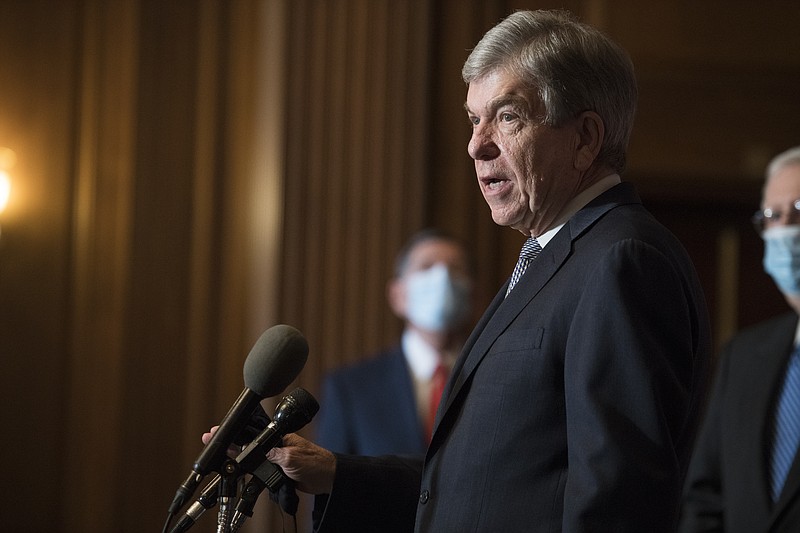The $1.2 trillion infrastructure bill President Joe Biden is expected to sign Monday reached its destination, in part or despite of, lawmakers changing lanes and crossing party lines.
Two lawmakers from Missouri were among those who crossed party lines in votes on the federal infrastructure bill.
U.S. Sen. Roy Blunt was one of 19 Republican senators who voted for the bill.
Blunt said in a statement after the vote that Missouri is among the states that stand to benefit the most from the $1.2 trillion bill. And he expects more than $8 billion from the legislation to funnel directly to the state - to improve safety and reliability of roads and highways.
"It includes much-needed funding for ports and waterways," Blunt said. "And, it focuses resources toward ending the digital divide that has left nearly one-third of rural Missourians without access to broadband."
Missouri's location in the center of the country gives it a competitive advantage over other states, he continued. The bill will help Missouri maintain its advantage, while improving quality of life for families, businesses and farmers, he said.
U.S. Rep. Cori Bush, a Democrat from St. Louis, also broke with her party, and voted against the bill.
In a statement she released after the vote, she said without passage of the "Build Back Better" bill, it didn't follow through on the promise to make communities better.
Build Back Better is a sweeping $1.7 trillion social services bill the House postponed voting on until later in November. Among the services the bill offers is the extension of child tax credits, funding for preschool and child care, and billions of dollars for climate protection programs.
Bush was one of six Democratic representatives, primarily the most progressive members of the party, who voted against the infrastructure bill.
U.S. Rep. Blaine Luetkemeyer, a Republican from St. Elizabeth, and the ranking member of the House Financial Services Committee, said he supported infrastructure-specific portions of the bill but had to vote against it because it included $700 billion in spending that wasn't connected to infrastructure.
The bill contains about $500 billion in infrastructure, Luetkemeyer said, which is about what came out of the U.S. House Transportation and Infrastructure Committee, on which Missouri Rep. Sam Graves is the ranking member.
However, lawmakers tacked on spending for other purposes.
"This $1.2 trillion bill is about the same amount that Sam was talking about; about $500 billion in infrastructure," Luetkemeyer said Wednesday. "But the other $700 billion is about Green New Deal stuff - electric charging stations, subsidies to be able to buy electric cars. Stuff like that. There's even some Medicare stuff in it. There's a lot of stuff in there that doesn't need to be in there. And it's not paid for. Depending on who you talk to, there's $250-$400 billion that's not paid for. That's going to be additional debt."
Graves said Friday that he had made it clear from the very beginning that Republicans were willing to work across the aisle to pass responsible infrastructure spending, prioritizing long-term expansion of expiring funding for roads and bridges.
However, Democrats hijacked and politicized the process, he said in an email to the News Tribune.
"That resulted in the entire House being sidelined and ignored by the Senate in developing the infrastructure bill," Graves said. "The Speaker then used the infrastructure bill as a Trojan horse to ensure passage of an entirely partisan, even more costly reconciliation bill full of radical priorities."
Graves added he supported the need to invest in infrastructure, but couldn't support a bill whose funding was established. And he wouldn't support adding $250 billion to the national debt, fueling inflation.
Luetkemeyer also said if lawmakers had kept additional spending out of the bill, he could have supported it.
Missouri Gov. Mike Parson, a Republican, said last week that the state is excited about opportunities the infrastructure bill presents.
"Missouri's on the right track now," he said. "We're going to have a real opportunity to take that to another level, and do a lot of things we've needed to do for a long time - whether it's the interstate systems, whether it's county-lettered roads, whether it's bridges that we've been working on."
The U.S. Senate passed the bill in August, in a 69-30 vote.
The bill received 228 "yes" votes and 206 "no" votes in the House. It required 218 to pass.
The White House intends to hold a large ceremony surrounding President Joe Biden signing the bill Monday. The event is expected to be so large that the White House intends to hold it on the South Lawn of the White House. A bipartisan group of senators wrote the original bill.
Luetkemeyer said Democrats who couldn't get the Green New Deal done have "hoodwinked" their own caucus into supporting the bill.
"I'm not a big fan of this extra stuff in there. If they had kept it out, I'd have supported the bill," he said. "If they'd have paid for it, I'd have supported the bill.
"When you do all those things, it's just hanging another debt on our kids and grandkids," he said.

